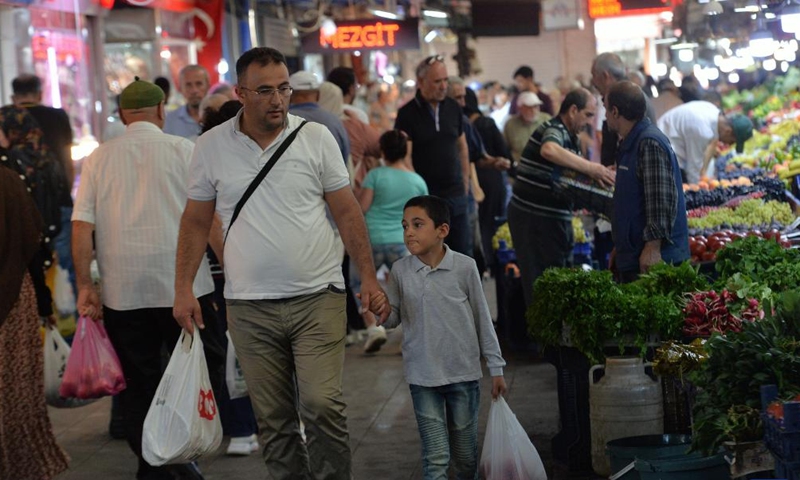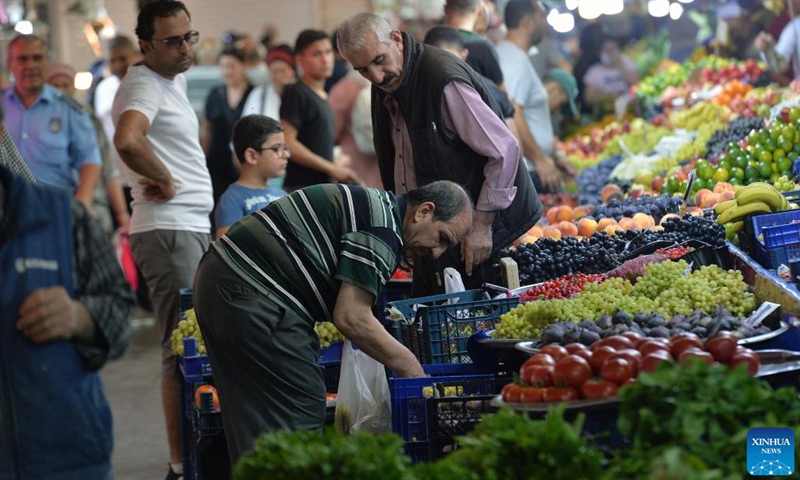
People shop at a market in Ankara, Türkiye, on Aug. 25, 2022.Photo:Xinhua
Despite government efforts, surging consumer prices have hit hard the 84 million people in Türkiye.
Tuncay Yuksel, a thrift shop owner in Ankara, said his family has crossed food products such as meat and dairy off grocery lists, due to soaring prices since the start of this year.
"Everything has become more expensive, and the purchasing power of citizens has dropped considerably. Some people cannot afford to buy for their basic needs," Yuksel told Xinhua in his shop in the historic Ulus District while attending to consumers coming in for bargains.
According to a recent survey by Istanbul-based Yoneylem Social Research Center, over 53 percent of Turkish respondents said their daily expenses are unable to cover their demands, with 69.3 percent struggling to pay for food.
At the beginning of July, the Turkish government announced the increase of the minimum wage to 5,500 liras (about 302 US dollars) to protect millions of workers from inflation which reached about 80 percent at a 24-year-high.
But sustained price hikes have further eroded the purchasing power of households.
In late July, the pro-government Confederation of Turkish Trade Unions set the monthly poverty line for a family of four at nearly 22,280 Turkish liras, and the minimum food expenditure required each month for such a family is about 6,839 Turkish liras.

People shop at a market in Ankara, Türkiye, on Aug. 25, 2022.Photo:Xinhua
According to a recent survey by the Consumer Rights Association, 90 percent of the population now lives below the poverty line.
"We are not buying meat products anymore, nor dairies, and because of this, I have a vitamin deficiency, and I'm taking pills," said Nevin Gungor, a pensioner in her sixties, adding she didn't expect the situation might turn better in the near future.
Fatma Eren, a homemaker, also complained about the prices.
"Food prices have skyrocketed, every time I go out for my groceries, I see new prices and I have to cut the number of my purchases over time because it is way too expensive. We cannot make ends meet," she said.
In the same vein, local media reported that a diesel oil price hike for two consecutive weeks was projected to further push up the living costs in Türkiye.
According to the Turkish online energy journal Enerji Gunlugu, median prices across the country for diesel oil have hit about 27 liras following the latest increase on Friday.
The surging fuel prices are expected to bring the costs of common goods, mainly foodstuffs to a significant rise, Cemil Direkci, vice president of the Main Fuel Distributors Association, told reporters on Friday.
But not everyone painted a bleak picture of the future.
Abbas Karabenli, a 39-year-old chestnut peddler in Ulus, said "I have nothing to complain about as long as we can work and provide for our families. Inflation is on the rise in most countries."
Türkiye has shocked markets with a 100 basis point interest rate cut on Aug. 18 despite galloping inflation, as the central bank loosens policy further to spur growth ahead of a general election next year.
The central bank was projected to keep its benchmark interest rate at 14 percent for the following months, a rate which has already pushed real Turkish yields into deeply negative territory.
Meanwhile, the Turkish government is announcing plans to ease the burdens of inflation on its citizens. Subsidized food products, including flour, oils, and meat, are sold at designated markets, with up to a 25 percent discount rate depending on the product.
The government has also said that the debts of 6 million citizens with low income that were hit hardest during the last few years of economic volatility would be erased. Debts to be nullified include electricity, gas, water, and telephone bills, amounting to some 30 billion liras in total, according to the Hurriyet daily.
